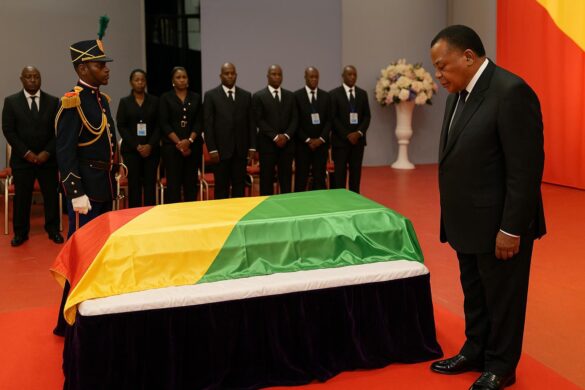Nation Gathers for Final Tribute
The main hall of the Palais des Congrès fell into a hushed silence on October 13th as the Republic paid its final respects to André Georges Mouyabi, former President of the National Assembly, during a ceremony presided over by Head of State Denis Sassou Nguesso.
Beneath a catafalque draped in the national tricolor flag, the President laid a wreath and then bowed his head, a gesture broadcast live by Télé Congo and mirrored by government members, legislators, and uniformed cadets lining the aisle in a display blending military precision with solemn ecclesiastical chants.
Outside, citizens from all eight districts of Brazzaville had been queuing since dawn, many carrying photographs of the statesman whose voice once resonated in the parliamentary chamber during the 1960s. For them, the vigil was not merely a ritual but an acknowledgment of decades spent defending rural constituencies.
Roots in Bouenza, Ascent in Brazzaville
Born in 1935 in Ditadi, Loudima district, Mouyabi began his schooling at the modest Mbounda mission before graduating from the Collège Moderne in Dolisie. Former classmates remember a diligent student who crossed the Niari river barefoot each week, eager for textbooks unavailable in the interior.
This thirst for knowledge paved his way to Brazzaville, where civil service exams opened doors to the Departmental Administration. His appointment as Government Commissioner-Prefect of Dolisie in 1965 placed the 30-year-old at the heart of post-independence reconstruction, mediating land disputes and railway workers’ strikes.
Election to the National Assembly followed, representing Madingou, Loutété and later Mfouati. Rural delegates praise his habit of cycling along red laterite tracks to consult village elders, earning a reputation for humility.
Navigating Turbulent Decades
The political tide turned in August 1968 when President Alphonse Massamba-Débat dissolved the legislative assembly, ending Mouyabi’s term as President. Observers note he accepted the decree without confrontation, later citing this decision as evidence of his preference for institutional stability over personal power.
He subsequently served as Minister of Industry, Mines, Urban Planning, Housing, and Civil Service in successive governments. A former colleague recalls nights spent drafting salary reforms to ensure teacher payments after oil shocks hit finances in the early 1980s.
Between 1996 and 1997, he became a special advisor to President Pascal Lissouba, focusing on decentralization. Although the 1997 civil conflict ended this agenda, internal memos attributed to him advocated dialogue with municipal councils to protect service delivery.
Voice of the Assembly
Delivering the official eulogy, the First Secretary described a “tireless architect of consensus” whose files were “annotated in precise blue ink, never red,” a metaphor applauded by legislators from both majority and opposition blocs who rose together despite ideological divisions.
